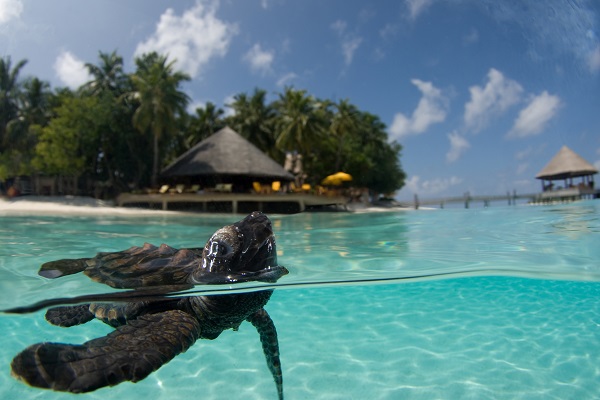The Banyan Tree Group has taken the bold but necessary step of addressing plastic menace and pollution by first saying no to single-use plastic, then thinking of ways to overcome common operational habits. Mallika Naguran reports.
Singapore, 23 April 2018. Banyan Tree Hotels & Resorts is saying no to single-use plastic.
Responsible hospitality practices such as rejecting single use plastic will benefit marine life in places such as Angsana Ihuru. Courtesy Banyan Tree Group.
The hotel operator and developer of brands Banyan Tree, Angsana, Cassia and Dhawa will implement a plan for all its properties to phase out the use of disposable plastics within a year.
This will include plastic straws, plastic water bottles and disposable plastic cutlery.
The Banyan Tree Group manages and/or has ownership interests in over 43 hotels and resorts, 60 spas, 72 retail galleries; as well as three golf courses in 24 countries.
The announced pledge is in support of Earth Day 2018 theme End Plastic Pollution. It addresses the polluting effects that plastic has on the environment and marine life.
Since its inception in 1994, Banyan Tree Hotels & Resorts has embarked on a journey of stewardship and honoured its commitment towards the environment and communities through its philosophy of “Embracing the Environment, Empowering People”.
This announcement marks the next step in its commitment as a sustainable tourism brand. Dr Steve Newman, the Group Sustainability Director, said, “The durability of plastic led to its global success and also its role now as a global threat to environmental and human health. As a company founded on a core ethos of environmental preservation and restoration, Banyan Tree is committed to eliminate single-use plastic. We must do more than clean up waste, we must reduce plastic use and dispose of a throwaway mind-set, for the good of the planet and our future.”
Action Against Single Use Plastic
In reply to Gaia Discovery’s query, Dr Newman elaborated on what the hotel group will do to address plastic use and pollution. “Banyan Tree currently has 41 resorts around the world that are each at different stages of their journey in eliminating single-use plastic. Due to the global concern for single-use plastic, and the fact that Banyan Tree was founded with the core value of sustainable development and environmental protection, it was necessary for us to establish a coordinated approach to assisting each property with reducing and eliminating single-use plastic. Some of our properties have already phased out plastic straws, and some use on-site glass bottle systems for water,” said Dr Newman.
One of the sites he was referring to is Angsana Ihuru in the Maldives where glass bottle water system has replaced plastic water bottles. By simply changing the material of drinking water container, the hotel based on an island in a region with no proper waste management has prevented 40,000 plastic bottle trash from entering either the landfill or the ocean every year.
Now that's a lot of plastic saved from being created and transported - requiring a lot of oil resources - as well as being dumped irresponsibly.
“Presently we are undertaking a review and benchmark of plastics across the Banyan Tree group: identifying what we use, how much, and what are the options for replacement. This is an essential first step to mapping out our elimination strategy and tracking our success. We have already implemented an awareness campaign, that we will be driving during the course of the year to effect behavioural change and garner support from our guests and staff,” he added.
Coming up, Banyan Tree will introduce signature Sustainable Itineraries across its properties for the environmental-conscious travellers later this year.
In isolated places and island holidays, it is important for resorts such as Angsana Ihuru to address single-use plastic in their sustainability policy to prevent environmental harm. Courtesy Banyan Tree Group
Relevant articles:
- Plastic Bags: Reducing Pollution Worldwide
- Prevent plastic waste with RefillMyBottle app
- Bali students think waste not
Banyan Tree 2017 Sustainability Highlights
Banyan Tree last year embraced responsible tourism ethos in a number of ways in 2017. It supported the International Year of Sustainable Tourism for Development, as declared by the United Nations World Tourism Organisation.
It took the opportunity to align its environmental and social contributions to the Sustainable Development Goals (SDGs) or Global Goals for Sustainable Development. All 17 SDGs were directly or indirectly addressed through Banyan Tree’s efforts on seven key areas: climate change, pollution and waste, biodiversity, ethical compliance and corruption, data security, employee satisfaction and leadership.
Some of the company’s responsible tourism achievements in the past year include 15,142 planted trees, 32,889 kilograms of trash collected and the support of 100 youths through its Seedlings mentorship programme.

